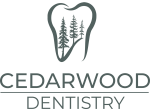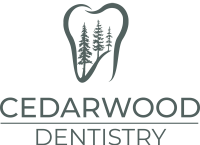Sometimes when teeth are beyond repair, the only option is replacement. Depending on the severity, a patient may require either a full or partial tooth replacement. When it comes to teeth replacement, dentures are an affordable option for many patients.
Contents
What Are Dentures?
Dentures are a removable replacement for missing teeth. The base is made of acrylic, and the teeth are either acrylic, plastic, or porcelain, depending on the type you get. They can look either picture-perfect or retain the natural look of patients’ smiles, even for people with diastemas, or gaps between the teeth.
We recommend dentures for patients that are okay with having a removable replacement and want a more affordable alternative than a fixed replacement. Not to mention, they can replace more teeth with the amount of money required. For example, most patients opt for dentures over veneers due to cost. While dentures aren’t a fix for replacing a single tooth, they are for patients who require partial or total teeth replacement.
Complete vs. Partials
There are two main types of dentures: complete vs. partial. Patients that need to replace all of their teeth require a full set of dentures. However, if only some teeth need replacing, then partials are a better option. Some partials are flexible, made of a pink material that flexes around the teeth. The only downside of that is when patients chew, they typically sense more movement.
Traditional partials have a cast metal frame made out of cobalt chrome, a shiny metal material. These types of dentures are typically more stable for chewing and eating, but they do have the potential to show clasps. Because of this, some patients don’t like them because they’re less aesthetic than a flexible partial.
When Are Dentures Needed?
Dentures are recommended for patients who are either missing multiple or all of their teeth. On the other hand, people who have unrestorable teeth also may benefit from them. These are patients who need to get the teeth pulled and then replaced with something. Dentures are sometimes the only thing we can do for patients with tooth loss or who don’t have restorable teeth, or it may just be the most affordable option.
Restoration vs. Replacement
We always tell patients that if the teeth are restorable, we wouldn’t recommend removing them solely due to tooth problems. If the teeth are restorable, then we would work to maintain and restore them. Removing problem teeth and getting dentures will result in trading in teeth problems for denture problems down the road. Dentures are really only a replacement for missing or unrestorable teeth, not a replacement for problem teeth.
Dentures are also only recommended for patients who don’t mind removing something for at least eight hours a day. However, they aren’t suggested for people with a strong gag reflex as they have a top portion that goes along the roof of the mouth, and the bottom part stretches and touches close to the tongue.
Why Replacement Isn’t Always Optimal
For people who think they won’t have issues without teeth, dentures don’t have as much chewing power. An upper denture has 20-30% of the chewing power of upper teeth, while a lower denture has about 10% of the chewing power of lower teeth. That’s because they sit on the tissue, moving and shifting every time you bite up and down, meaning less biting power. Unfortunately, this also means hard-to-chew food such as apples are off-limits.
Denture Care & Cleaning
Dentures need to be removed for a period of time each day to let the tissues breathe as they aren’t meant to be covered all day long. People who keep them on all day long could experience fungus growth such as candidiasis, which ends up burning the tissue.
How to Clean
Dentures should be kept in liquid every day. When they’re removed, they should only be cleaned with water and then put into a container of water. Adding a denture tablet to the water is optional. While tablets aren’t necessary, most patients like to use them at least once a week to freshen up their dentures, as most tablets have a minty taste. Patients should also have a reserved toothbrush or a denture brush for their complete or partial dentures. Simply brush with water to clean; however, you can use a little bit of dish soap if needed. You should never use toothpaste because it can scratch them.
Yearly Dental Visits Still Required
Patients with a full set of dentures and no remaining teeth should still come to the dentist once a year. During the yearly appointment, we complete a neck and head exam along with a tissue check to ensure there are no signs of oral cancer or other concerns. Another important part of the yearly visit is ensuring the dentures fit correctly and aren’t causing sores.
Are Dentures Covered By Insurance?
Most insurances do cover a portion of dentures. However, each patient should speak with their dentist beforehand and consider getting a pre-authorization so they know exactly how much would be covered.
At Cedarwood Dentistry, we cultivate dental health through personalized care. We offer a variety of dental services, including family dentistry, cosmetic dentistry, and emergency care in Midlothian, Virginia. Whether you last visited the dentist six months or six years ago, we can help bring your smile to life. Schedule your dentist appointment today by calling 804-379-9375.
Share the love!


